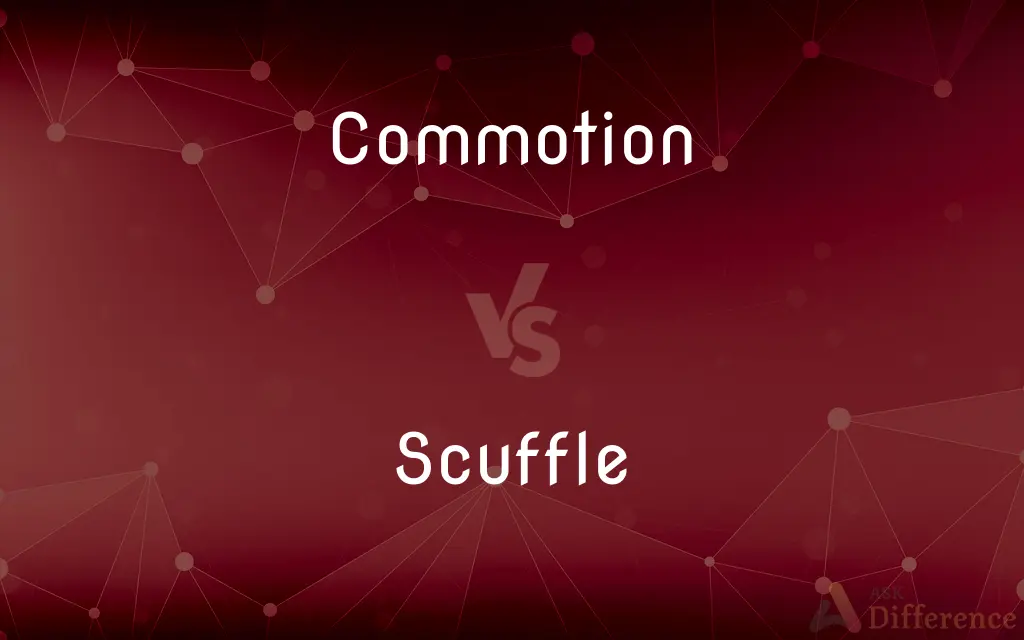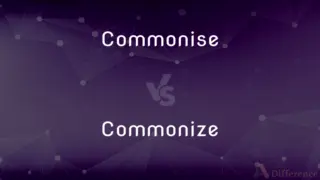Commotion vs. Scuffle — What's the Difference?
By Maham Liaqat & Fiza Rafique — Updated on April 6, 2024
Commotion refers to a state of noisy confusion or disorder. Scuffle involves a short and confused fight or struggle at close quarters.

Difference Between Commotion and Scuffle
Table of Contents
ADVERTISEMENT
Key Differences
Commotion encompasses a broad range of disturbances, from loud, noisy uproars to general disorder, affecting a relatively large area or group of people. Scuffle, on the other hand, specifically refers to a physical altercation that is typically brief and involves a small number of participants, often without clear or formalized intentions.
A commotion can be caused by a variety of factors, including but not limited to, public demonstrations, celebrations, or any event leading to tumultuous noise and confusion. In contrast, a scuffle is a result of a direct physical confrontation between individuals, usually arising from a disagreement or conflict, and is characterized by its lack of structure and brevity.
While a commotion can be both audible and visible, indicating a significant level of chaos or disorder that draws public attention, a scuffle is often a more contained incident, possibly going unnoticed by a larger audience, and might not necessarily result in significant noise.
Commotions often have the potential to escalate into more serious situations, affecting the safety and order of the surrounding environment, whereas scuffles are generally resolved quickly, either by the parties involved or through the intervention of others, and have less potential for widespread impact.
The terms also differ in their connotations and contexts of use; "commotion" can apply to non-violent disturbances and is not exclusively associated with physical altercations, whereas "scuffle" implies a physical struggle or fight, albeit a minor one.
ADVERTISEMENT
Comparison Chart
Definition
Noisy confusion or disorder
Short and confused fight or struggle at close quarters
Scale
Can affect a large area or group
Usually involves a small number of individuals
Cause
Varied, including events leading to noise and confusion
Arises from direct physical confrontation
Visibility
Audible and visible disorder
More contained, might go unnoticed by larger audiences
Potential Impact
Can escalate into more serious situations
Generally resolved quickly with less widespread impact
Connotation
Broad, can be non-violent
Implies a physical altercation, though minor
Compare with Definitions
Commotion
Celebrations.
The team's victory sparked a commotion in the streets as fans celebrated.
Scuffle
Characterized by confusion.
Witnesses described the incident as a scuffle, with no clear aggressor.
Commotion
Noisy disturbances.
The sudden commotion in the crowd turned heads as people tried to see what was happening.
Scuffle
Struggles at close quarters.
The officer intervened in a scuffle between two individuals near the bar.
Commotion
Public demonstrations.
The protest caused a significant commotion downtown, disrupting traffic.
Scuffle
Result of disagreements.
The debate heated up, resulting in a scuffle outside the hall.
Commotion
Events leading to tumult.
The power outage at the concert caused a commotion among the attendees.
Scuffle
Minor altercations.
The scuffle in the alley was over before the police arrived, leaving little evidence of the fight.
Commotion
General disorder.
A commotion ensued in the classroom when the fire alarm sounded unexpectedly.
Scuffle
Brief physical confrontations.
A scuffle broke out between two players during the game but was quickly resolved.
Commotion
A condition of turbulent motion.
Scuffle
To fight or struggle confusedly at close quarters.
Commotion
An agitated disturbance; a hubbub
Heard a commotion in the hall.
Scuffle
To shuffle.
Commotion
Civil disturbance or insurrection; disorder.
Scuffle
A rough disorderly struggle at close quarters.
Commotion
A state of turbulent motion.
Scuffle
A hoe that is designed to work soil by being pushed and pulled. Also called Dutch hoe, scuffle hoe.
Commotion
An agitated disturbance or a hubbub.
Scuffle
A rough, disorderly fight or struggle at close quarters.
Commotion
Disturbed or violent motion; agitation.
[What] commotion in the winds !
Scuffle
(slang) Poverty; struggle.
Commotion
A popular tumult; public disturbance; riot.
When ye shall hear of wars and commotions.
Scuffle
(archaic) A child's pinafore or bib.
Commotion
Agitation, perturbation, or disorder, of mind; heat; excitement.
Scuffle
A Dutch hoe, manipulated by both pushing and pulling.
Commotion
A disorderly outburst or tumult;
They were amazed by the furious disturbance they had caused
Scuffle
(intransitive) To fight or struggle confusedly at close quarters.
Commotion
The act of making a noisy disturbance
Scuffle
(intransitive) To walk with a shuffling gait.
Commotion
Confused movement;
He was caught up in a whirl of work
A commotion of people fought for the exits
Scuffle
(slang) To make a living with difficulty, getting by on a low income, to struggle financially.
Scuffle
To strive or struggle with a close grapple; to wrestle in a rough fashion.
Scuffle
Hence, to strive or contend tumultuously; to struggle confusedly or at haphazard.
A gallant man had rather fight to great disadvantage in the field, in an orderly way, than scuffle with an undisciplined rabble.
Scuffle
A rough, haphazard struggle, or trial of strength; a disorderly wrestling at close quarters.
Scuffle
Hence, a confused contest; a tumultuous struggle for superiority; a fight.
The dog leaps upon the serpent, and tears it to pieces; but in the scuffle the cradle happened to be overturned.
Scuffle
A child's pinafore or bib.
Scuffle
A garden hoe.
Scuffle
Disorderly fighting
Scuffle
A hoe that is used by pushing rather than pulling
Scuffle
An unceremonious and disorganized struggle
Scuffle
Walk by dragging one's feet;
He shuffled out of the room
We heard his feet shuffling down the hall
Scuffle
Fight or struggle in a confused way at close quarters;
The drunken men started to scuffle
Common Curiosities
What causes a commotion?
A commotion can be caused by anything from public demonstrations, celebrations, sudden disturbances, to general disorder.
Are commotions always loud?
While commotions are often associated with noise, they can also refer to any form of disorder or tumult, not exclusively loud ones.
Can a scuffle cause a commotion?
Yes, a scuffle can lead to a commotion, especially if it attracts public attention and contributes to disorder or confusion.
Is a scuffle always violent?
Scuffles are characterized by physical struggle, so they involve a degree of violence, though usually minor and brief.
Do scuffles have legal consequences?
Depending on the severity and outcome, scuffles can have legal consequences, especially if they result in injury or violate laws.
Can commotions be positive?
Yes, commotions can be positive, such as those arising from celebrations or expressions of joy, though they still involve disorder.
How long does a scuffle last?
A scuffle is generally brief, often resolved in a matter of minutes, and involves physical struggle or fighting at close quarters.
How can commotions be managed?
Managing commotions often requires addressing the underlying cause, calming the involved parties, and restoring order, sometimes involving law enforcement.
What's the difference between a fight and a scuffle?
A scuffle is a type of fight characterized by being brief, confused, and at close quarters, often less severe than more prolonged fights.
How do bystanders typically react to scuffles?
Bystanders may try to intervene, call for help, or stay back to avoid getting involved, depending on the situation and perceived threat.
Share Your Discovery

Previous Comparison
Commonise vs. Commonize
Next Comparison
Software vs. AudiowarezAuthor Spotlight
Written by
Maham LiaqatCo-written by
Fiza RafiqueFiza Rafique is a skilled content writer at AskDifference.com, where she meticulously refines and enhances written pieces. Drawing from her vast editorial expertise, Fiza ensures clarity, accuracy, and precision in every article. Passionate about language, she continually seeks to elevate the quality of content for readers worldwide.















































